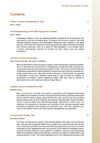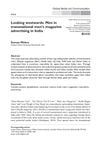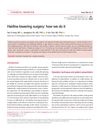 2 citations,
January 2014 in “Archives of Aesthetic Plastic Surgery”
2 citations,
January 2014 in “Archives of Aesthetic Plastic Surgery” The procedure effectively created natural-looking hairlines and improved facial balance in female patients.
 November 2017 in “Dermatologic Clinics”
November 2017 in “Dermatologic Clinics” Men are increasingly interested in cosmetic treatments that enhance masculinity and address aging without downtime, with tailored approaches for different ethnicities and a focus on hair restoration and body contouring.
 6 citations,
December 2010 in “Case Reports”
6 citations,
December 2010 in “Case Reports” A woman with high testosterone and an adrenal nodule had an ovarian tumor causing her symptoms, which improved after the tumor was removed.
 71 citations,
August 2019 in “The journal of sexual medicine”
71 citations,
August 2019 in “The journal of sexual medicine” Testosterone treatment effectively causes male physical development in transgender male adolescents but may lead to side effects like acne, higher BMI and blood pressure, lower good cholesterol, and decreased bone density.
 18 citations,
June 1988 in “Culture, medicine and psychiatry”
18 citations,
June 1988 in “Culture, medicine and psychiatry” The perception of excessive hair growth in women as abnormal is more influenced by cultural norms than by medical reasons.
 1 citations,
January 2020 in “Elsevier eBooks”
1 citations,
January 2020 in “Elsevier eBooks” Hormone therapy is safe and effective for transgender adults, but requires regular monitoring and mental health support.
 46 citations,
May 1986 in “Seminars in Reproductive Medicine”
46 citations,
May 1986 in “Seminars in Reproductive Medicine” Testosterone and dihydrotestosterone affect hair growth, and new techniques like the folliculogram help study it, but fully understanding hair growth is still complex.
 2 citations,
October 2017 in “Global Media and Communication”
2 citations,
October 2017 in “Global Media and Communication” The conclusion is that top men's magazines in India promote Western ideals of masculinity, favoring fair-skinned, youthful, and Western Caucasian men.
 15 citations,
August 1998 in “Australasian journal of dermatology”
15 citations,
August 1998 in “Australasian journal of dermatology” The document concludes that various cosmetic and drug treatments are available for hirsutism, and some new drugs show promise.
 1 citations,
October 2018 in “Operative techniques in otolaryngology--head and neck surgery”
1 citations,
October 2018 in “Operative techniques in otolaryngology--head and neck surgery” New techniques can effectively treat aging around the eyes.
 180 citations,
September 1999 in “British Journal of Dermatology”
180 citations,
September 1999 in “British Journal of Dermatology” Hair loss affects self-esteem and quality of life; treatments can help.
 December 2022 in “The Journal of Cosmetic Medicine”
December 2022 in “The Journal of Cosmetic Medicine” Hairline-lowering surgery effectively reduces a high hairline with immediate, noticeable results.
 475 citations,
January 2016 in “International Review of Psychiatry”
475 citations,
January 2016 in “International Review of Psychiatry” The document concludes that non-binary individuals need compassionate support and recognition in healthcare, without being pathologized.
 7 citations,
May 2019 in “British Journal of Dermatology”
7 citations,
May 2019 in “British Journal of Dermatology” Transgender and nonbinary individuals experience hair loss, with transmen on testosterone seeing more severe hair loss, while feminizing hormones may stabilize hair loss in transwomen.
 50 citations,
May 2020 in “Journal of Clinical Medicine”
50 citations,
May 2020 in “Journal of Clinical Medicine” Non-binary transgender individuals need personalized hormonal treatments for better well-being and quality of life.
 January 2013 in “Hair transplant forum international”
January 2013 in “Hair transplant forum international” Both surgical hairline advancement and follicular unit transplantation effectively lower the female hairline, but they differ in speed, scarring, and naturalness of results.
20 citations,
March 2015 in “Archives of Plastic Surgery” Facelifts for Asians are challenging due to thicker, heavier skin.
 April 2018 in “Routledge eBooks”
April 2018 in “Routledge eBooks” Gender identity can be more diverse than just male or female.
 8 citations,
November 2019 in “Dermatologic Clinics”
8 citations,
November 2019 in “Dermatologic Clinics” AGA treatments like minoxidil and LLLLT are safe and effective for gender minority patients.
 86 citations,
May 2013 in “American journal of obstetrics and gynecology”
86 citations,
May 2013 in “American journal of obstetrics and gynecology” Gynecologists should provide comprehensive care for transgender patients, including mental health evaluation, hormone therapy, and surgical options, while monitoring for side effects and ensuring patient safety.
 42 citations,
May 2003 in “Mini-reviews in Medicinal Chemistry”
42 citations,
May 2003 in “Mini-reviews in Medicinal Chemistry” New steroidal compounds could be effective for treating conditions related to 5α-reductase enzyme activity.
 29 citations,
May 2010 in “Annals of Pharmacotherapy”
29 citations,
May 2010 in “Annals of Pharmacotherapy” Finasteride may help some women with hair loss, but better options exist.
 23 citations,
October 2016 in “Journal of Midwifery & Women's Health”
23 citations,
October 2016 in “Journal of Midwifery & Women's Health” The document concludes that health care providers should offer culturally competent care and more research is needed to improve health outcomes for transgender individuals.
 17 citations,
February 2020 in “Journal of Pediatric and Adolescent Gynecology”
17 citations,
February 2020 in “Journal of Pediatric and Adolescent Gynecology” Early medical support for transgender youth is important for their health, with low regret for gender-affirming hormone use and a need for knowledgeable care providers.
 January 2021 in “Journal of cosmetology & trichology”
January 2021 in “Journal of cosmetology & trichology” Ageratum conyzoides L. extract may effectively and safely treat hair loss.
 147 citations,
April 1994 in “Drug Safety”
147 citations,
April 1994 in “Drug Safety” Some drugs can cause hair loss or increase hair growth, but these effects are usually reversible when the drug is stopped.
 April 2023 in “Journal of the American Psychoanalytic Association”
April 2023 in “Journal of the American Psychoanalytic Association” Male pattern hair loss can cause significant emotional distress for men.

Hormones, especially testosterone and DHT, are key for penis development and function, and testosterone therapy may help with erectile dysfunction in those with low levels.
 2 citations,
January 1908 in “Journal of the American Medical Association”
2 citations,
January 1908 in “Journal of the American Medical Association” Fear of hair-related issues causes significant mental distress, especially in high-stress women.
 March 2017 in “De Gruyter eBooks”
March 2017 in “De Gruyter eBooks” The Leechbook shows how hair and sexual health were key to medieval masculinity and some remedies may still be useful.





























